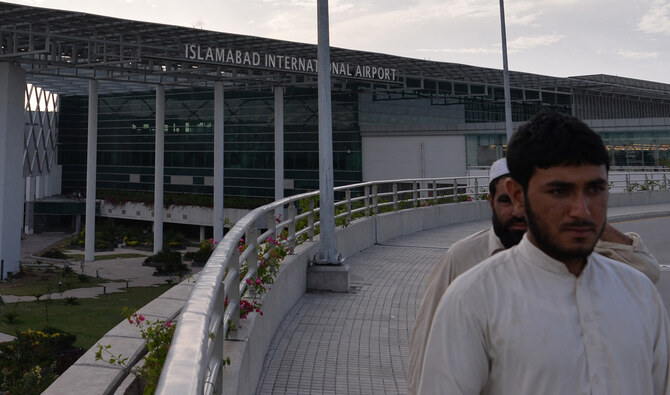KARACHI: Pakistan’s national currency on Thursday breached the psychological barrier of Rs300 against the US dollar in interbank market amid rising demand for greenback among business community to make import payments.
Pakistan's rupee closed at Rs300.22 at the interbank market as compared to the previous day’s closing at Rs299.64, registering a decline by 0/19%.
The currency was also trading at Rs314 against the US dollar in the open market while it was fluctuating somewhere around Rs325 in the black market, said traders and the Exchange Companies Association of Pakistan (ECAP).
“The appetite for the dollars is growing since the government has allowed imports of goods, including non-essential items, which is exerting pressure on the Pakistani rupee,” Zafar Sultan Paracha, ECAP general secretary, told Arab News.
He said the currency depreciation amid a shortage of US dollars was due to the agreement signed by the previous government of former prime minister Shahbaz Sharif that binds the country to liberalize import trade.
“They knew that we have very low foreign exchange deposits,” he continued. “Still, they signed the agreement that calls for limiting the spread between open and interbank markets at 1.25 percent.”
The spread between open and interbank market has widened by 5 percent now, which is much higher than 1.25 percent that the country had to maintain in any five consecutive days under the IMF deal.
The outgoing coalition government had signed a nine-month stand-by arrangement (SBA) of $3 billion with the international lending agency in June to avoid looming default.
The IMF program among other conditions called for a return to a market-determined exchange rate and proper forex market functioning to absorb external shocks and eliminate forex shortages, and an appropriately tight monetary policy aimed at disinflation.
Pakistani analyst attributed the current rupee depreciation to the market-based exchange rate.
“The recent decline in rupee is due to the market-based exchange rate, where the rate of the currency is determined by market forces and trade-related payments,” Ali Nawaz, chief executive officer of Chase Securities, told Arab News.
However, he said the ongoing depreciation of the Pakistani rupee needed immediate attention.
“Whether rooted in economic challenges or IMF conditions, a balanced approach is crucial,” he continued, added: “In short term, just close the gap between official and unofficial rates and the remittances will themselves flow from formal channels.”
Currency dealers said the bulk of their business had shifted to the lucrative grey or black market where currency was trading at Rs325 vs dollar.
“The gap between interbank and grey market is at around Rs25 against the dollar, and it keeps growing,” ECAP’s Paracha said. “The legal market is drying up as most of the business has shifted to the grey market, including remittance and export proceed inflows.”
Malik Bostan, president of Forex Association, said big importers had made cartels and were depriving smaller importers from opening letter of credits (LCs).
“The big importers are drawing major share of LCs and also hoarding dollar which they sell to small importers at higher rates,” he told Arab News. “This is also one of the key reasons behind rupee depreciation and its implication of the high inflation.”
Bostan called for the digitization of LC opening process to ensure transparency, saying it would also address issue of under or over invoicing.
Pakistani analysts suggested that the country’s interim government should prioritize transparent communication, structural reforms, export promotion, and responsible monetary policies to stabilize the rupee and restore economic stability.
















